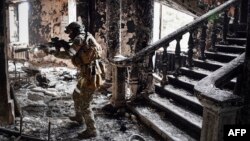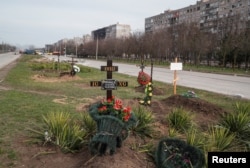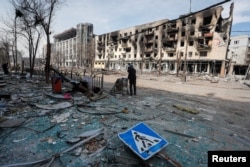Russian President Vladimir Putin on Tuesday defended the war in Ukraine as a "noble" mission, following claims of rape and violence against civilians and possible use of chemical weapons.
At a ceremony marking the 61st anniversary of the Soviet Union putting the first man into space, Putin said of the invasion, "Its goals are absolutely clear and noble." He added, "We didn't have a choice. It was the right decision."
The Russian president repeated his claim that the aim was to protect people in areas of eastern Ukraine and to protect Russia’s own security.
Since Putin sent Russian troops to Ukraine on February 24, about a quarter of Ukraine's 44 million population has been forced from their homes. Cities have been destroyed by airstrikes. And thousands of Ukrainians have been killed or injured.
Possible use of phosphorous
In the southern Ukrainian city of Mariupol, the city’s leader told the Associated Press that more than 10,000 civilians may have been killed in the war.
As the city prepares for another offensive, Ukraine and Western officials are investigating a claim that a poisonous substance was dropped on fighters defending the city. The fighters belong to the Azov Regiment, a far-right group that is now part of the Ukrainian military.
Pavlo Kyrylenko is governor of the eastern Donetsk area. He told CNN: "We know that last night around midnight a drone dropped some so-far unknown explosive device, and the people that were in and around the Mariupol metal plant, there were three people, they began to feel unwell.”
Ukrainian Deputy Defense Minister Hanna Malyar said it was possible that “phosphorous munitions” had been used in Mariupol. She added, "official information will come later."
Earlier on Monday, Donetsk separatist leader Eduard Basurin spoke on Russian state television. He said the group “will use chemical troops” against Ukrainian soldiers at a large steel factory in Mariupol “to smoke them out of there.” He then told Russia’s Interfax news agency Tuesday that the separatist forces “haven’t used any chemical weapons in Mariupol.”
Russia’s defense ministry has not answered requests for comment. British Foreign Secretary Liz Truss said her country was “working urgently” to investigate the report. And U.S. defense department spokesman John Kirby said in a statement that the U.S. could not confirm the drone report out of Mariupol.
The use, production and storage of chemical weapons are banned under the 1997 Chemical Weapons Convention. Phosphorous is not considered a chemical weapon under the convention. The substance, however, can cause severe burning. Its use is banned in civilian areas.
Accusation of war crimes, rape
After failing to capture the capital city of Kyiv, Russia pulled back its forces from surrounding areas and centered its efforts in the east.
The withdrawal of Russian forces from towns around Kyiv brought more charges of war crimes, including murder and rape.
United Nations official Sima Bahous told the U.N. Security Council on Monday: "We are increasingly hearing of rape and sexual violence." Kateryna Cherepakha, president of rights group La Strada-Ukraine, told the council: "Violence and rape is used now as a weapon of war by Russian invaders in Ukraine."
Russia's deputy U.N. ambassador denied the accusations. And the defense ministry said Ukraine's government was being directed by the United States to present false evidence of Russian violence against civilians.
In Bucha, outside of Kyiv, the Associated Press reported that Russian troops had used a children’s camp as an execution ground during the month-long occupation. Near the front of the camp, Russian soldiers placed a toy tank. It looked to be connected to a fishing wire. The tank set-up may have been meant to kill or injure anyone who touched it.
I'm Jonathan Evans.
Hai Do wrote this story based on reporting from RFE/RL, Reuters and The Associated Press.
____________________________________________________________________
Words in This Story
noble - adj. showing or having quality that others admire
drone - n. a small aircraft that flies without a pilot
execution - n. the act of killing someone







